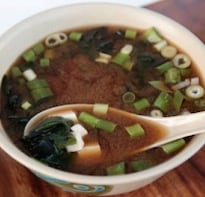Japanese people are more likely to reach 100 years old than anyone else in the world, a fact that some researchers attribute to their diet. So, are they right - and is eating tofu and squid the place to start?
Can you eat your way to a century? I am not referring to test cricketers, I'm talking about the Japanese diet. Or the Sardinian diet. Or the Ikarian diet. Or any one of half a dozen regional, usually traditional, ways of eating that have been credited with keeping an improbable proportion of their populations alive beyond the age of 100.Last week, the oldest man ever on record, Jiroemon Kimura, from Kyotango near Kyoto, passed away at the age of 116. His death, and the fact that the new record holder, 115-year-old Misao Okawa, is from Osaka, reminded us that the Japanese know a trick or two when it comes to living beyond 100. According to the UN they have the greatest proportion of centenarians in the world - and a great deal of that knowhow concerns diet.I have long taken an interest in how I might eat myself to old age. I visited the southern Japanese Okinawa islands whose population is said to include the largest proportion of centenarians in the country and met with some of them in what is supposedly the village with the oldest demographic in the world, Ogimi, little more than a dirt street lined with small houses, home to more than a dozen centenarians. Old folk tended vegetable patches or sat on porches watching a funeral procession go by. My family and I dined on rice and tofu, bamboo shoots, seaweed, pickles, small cubes of braised pork belly and a little cake at the local "longevity cafe" beneath flowering dragon fruit plants. Butterflies the size of dinner plates fluttered by and my youngest son asked if there was a KFC.The next day I interviewed American gerontologist, Dr Craig Willcox, who has spent many years investigating Okinawan longevity and co-wrote a book, The Okinawa Program, outlining his findings (recommending that we "Eat as low down the food chain as possible" long before Michael Pollan's similarly veg-centric entreaty).
Can you eat your way to a century? I am not referring to test cricketers, I'm talking about the Japanese diet. Or the Sardinian diet. Or the Ikarian diet. Or any one of half a dozen regional, usually traditional, ways of eating that have been credited with keeping an improbable proportion of their populations alive beyond the age of 100.Last week, the oldest man ever on record, Jiroemon Kimura, from Kyotango near Kyoto, passed away at the age of 116. His death, and the fact that the new record holder, 115-year-old Misao Okawa, is from Osaka, reminded us that the Japanese know a trick or two when it comes to living beyond 100. According to the UN they have the greatest proportion of centenarians in the world - and a great deal of that knowhow concerns diet.I have long taken an interest in how I might eat myself to old age. I visited the southern Japanese Okinawa islands whose population is said to include the largest proportion of centenarians in the country and met with some of them in what is supposedly the village with the oldest demographic in the world, Ogimi, little more than a dirt street lined with small houses, home to more than a dozen centenarians. Old folk tended vegetable patches or sat on porches watching a funeral procession go by. My family and I dined on rice and tofu, bamboo shoots, seaweed, pickles, small cubes of braised pork belly and a little cake at the local "longevity cafe" beneath flowering dragon fruit plants. Butterflies the size of dinner plates fluttered by and my youngest son asked if there was a KFC.The next day I interviewed American gerontologist, Dr Craig Willcox, who has spent many years investigating Okinawan longevity and co-wrote a book, The Okinawa Program, outlining his findings (recommending that we "Eat as low down the food chain as possible" long before Michael Pollan's similarly veg-centric entreaty).
Advertisement
Advertisement
Advertisement
Advertisement
For the latest food news, health tips and recipes, like us on Facebook or follow us on Twitter and YouTube.
Advertisement
